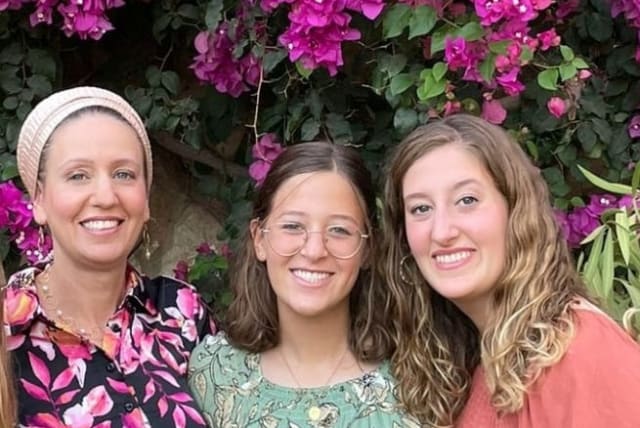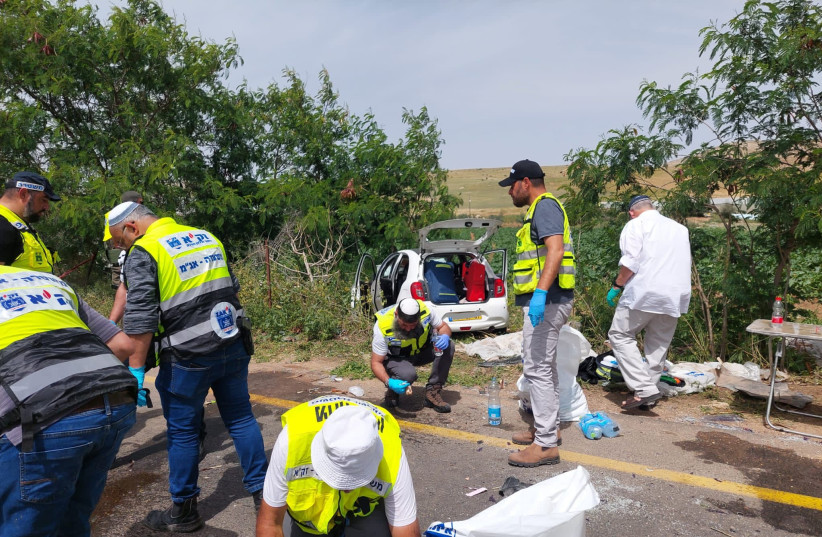Justifications of Dee sisters', mother's murder contrary to int'l law - analysis

Some people have justified the terror attack in which the Dees were murdered by saying that their residence in disputed territory rids them of civilian status.
In attempts to justify the terror attack that killed a mother and her two children in the Jordan Valley, some commentators have argued that the residence of the family in disputed territory meant that they were not civilians and thereby the use of violence against them was legitimate.
Such a standard is against the protections afforded to civilians under international law, and if applied generally, would legitimize human rights atrocities around the world.
The argument by supporters of Palestinian terrorism that Israeli settlers are not civilians is not a new one, but it has seen a resurgence with the killing of Maia, Rina and their mother Lucy Dee on Friday.
“These are not pictures of innocent civilians,” University of Tehran professor Seyed Mohammad Marandi wrote on Friday, sharing widely distributed photos that falsely identified the Dee sisters. “They are photos of militant colonizers who enforce apartheid and ethnic cleansing.”
Online, many anonymous and minor social media accounts have also justified the murders by describing the family as settlers rather than civilians.
Some like Ali Abuminah and the NGO CAGE have shied away from explicitly permitting terrorism against civilians, instead noting that residing in the disputed territories was a violent and dangerous act in and of itself and that terrorism against them was a natural outcome.
“The reality of settler-colonialism is that it is a very unsafe activity to come from overseas to violently steal the land of an indigenous people,” Abunimah wrote on Twitter on Friday. “It is unconscionable and reprehensible that Zionist land thieves involve their own children in such dangerous and criminal activities.”
CAGE has also made points against the civilian status of the UK citizen victims by comparing them to those that had left Britain to join the Islamic State.
“We are told of two sisters killed. We are not told of the choices made by parents to put them in harm's way. Tragic as it is for any loss of life, the family that took this choice did so knowingly of the provocation they were making when doing so,” was written on Sunday by CAGE, a UK-based non-profit that claims to advocate on behalf of communities and individuals it says have been misaligned and mistreated during counter-terrorism campaigns. “We do not mourn as a UK nation the actions of ‘stupid’ and ‘impressionable’ schoolgirls that go off to Syria and are killed.”
What does the international humanitarian law say?
The rules that guide warfare, international humanitarian law (IHL), have largely been developed to standardize acceptable wartime conduct and especially to prevent atrocities. One of the main principles of IHL is that of distinction, enshrined in Additional Protocol I (AP I) Article 48 of the Geneva Conventions, that civilians must be distinguished from combatants. Only military targets are permissible.
Civilians, according to AP I Article 50, are those not being part of military groups. When in doubt, it is assumed that a person is a civilian. The protected status of civilians is ironclad, almost without condition, as without it, civilians are opened to far too subjective standards that allow for their wanton slaughter.
The only way to relinquish one’s civilian protection, besides joining an armed group, is to take a direct part in hostilities. There is debate on what it means to be directly involved in combat, but it’s widely understood that it demands an act of physically harmful violence or military operation. It is also widely unacceptable in customary IHL that indirect involvement, such as being sympathetic to a war effort, engaging in business with a military force, or otherwise benefiting from the actions of an armed group would revoke protections. It is too nebulous and too permissive a standard — holding an opinion or a vendor selling food to a passing soldier could be rationalized to legitimize targeting a civilian. Residing in a disputed or occupied territory, therefore, does not remove civilian status.
If the standard would be changed to allow for the targeting of those deemed by one side to be illegally or illegitimately residing in a territory, it would result in widespread atrocities. Illegal or even legal immigrants could be justifiably targeted with violence by extremist organizations, just as much as any civilian living in any of the many disputed territories around the world could be targeted by a military force. The only protection would be if a force agrees with a territorial claim or a citizen’s right to reside in an area. This would be a subjective restriction on civilian protections, rather than universal protection.
Treating violence against civilians as a natural response disembodied from the will of an armed group or individual also damages the rule-based order for warfare.
Under IHL, states and non-state armed groups are obligated to actively avoid harming civilians. This is done not only by distinguishing them from combatants but by taking precautions and acting proportionally and discriminately as demanded by AP I. The reasoning of commentators like Abunimah not only shifts blame for an atrocity to the victim, it shifts away the obligations of armed groups to comply with IHL. Weakening the sense of need for compliance with IHL would lead to more violations of its provisions — more acts of terrorism and other war crimes.
In a speech to the press on Monday, Rabbi Leo Dee, the bereaved husband and father, said that the ability to differentiate between good and evil had been lost to humanity and called for a day to remember the difference on April 10 in honor of his family.
"We will never accept terror as legitimate," said the rabbi. "We will never blame the murder on the victims. There is no such thing as moral equivalence between terrorist and victim. The terrorist is always bad."
The deliberate targeting of civilians with violence is an essential restriction in warfare and must be supported when this standard is challenged. By ignoring the standard, an equivalent status would be given to civilians and war criminals. Not only Israeli civilians would be increasingly targeted, but the groundwork would be laid for attacks on civilians around the world.
Jerusalem Post Store
`; document.getElementById("linkPremium").innerHTML = cont; var divWithLink = document.getElementById("premium-link"); if (divWithLink !== null && divWithLink !== 'undefined') { divWithLink.style.border = "solid 1px #cb0f3e"; divWithLink.style.textAlign = "center"; divWithLink.style.marginBottom = "15px"; divWithLink.style.marginTop = "15px"; divWithLink.style.width = "100%"; divWithLink.style.backgroundColor = "#122952"; divWithLink.style.color = "#ffffff"; divWithLink.style.lineHeight = "1.5"; } } (function (v, i) { });

